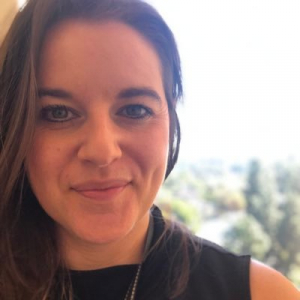Highlighting Faculty Member Melissa Sharpe
scarusoucla
Date published: 03/31/22

We study the neural pathways that contribute to forming different types of memories. We use modern neuroscience tools that allow us to record and manipulate specific neuronal populations in the awake, freely moving (and learning!) rodent during formation and recollection of new memories.
The complexity of our modern environment means that we need to form memories about a lot of different kinds of events. Some of the memories we form result from experiences that involve good things, like the delicious pasta you tried at a new Italian restaurant on Saturday night. Other memories might be formed around aversive events that capture situations that have been painful or made you uncomfortable (remember the political discourse at the last family function?). In fact, we also encode memories about events that are seemingly useless. Think, for example, about a recent trip to the cafe where you noticed the Hawaiian shirt your barista was wearing. All of these different kind of experiences need to be encoded in a manner that helps us to accurately represent our environment, while emphasizing the things that might be helpful (the pasta and the politics) to allowing us to function adaptively in our environment.
Our lab is interested in understanding the differences in the way that we encode these different types of memories. For example, how is it that we prioritize learning about really important things that involve very good things that we want to make sure we can experience again? And how do we make sure we’re less likely to use up precious cognitive real estate remembering the particular color of the Hawaiian shirt worn by the barista? We believe the key rests in where and how these memories are encoded. We are interested in these questions because changes in the brain—and the associated mnemonic processes—are known to lead to psychological disorders, like schizophrenia and addiction. Thus, the overarching goal of our research is to develop a deep understanding of how the brain forms memories as a result of learning experiences, and how this goes awry in psychological disorders. We hope this will eventually lead to new neural targets for treatment of these disorders.
You can find out more about our work at our website: https://sharpelab.psych.ucla.edu/, or by following Dr. Sharpe on Twitter @MelissaJSharpe.
In addition to research, Dr. Sharpe is heavily involved in the Pavlovian Society where she sits on the executive committee. This is in addition to her work within the steering committee of the Brain Research Institute (BRI) here at UCLA where she sits as the UCLA Society for Neuroscience Chapter President. Dr. Sharpe is also committed to increasing diversity and inclusion in neuroscience, and takes part in many mentoring programs that foster diversity in our undergraduate and graduate forums. Information about these programs are also available on the lab’s website.
Dr. Sharpe was born and raised in Sydney, Australia where she also obtained her undergraduate and graduate degrees. In 2015, Dr. Sharpe moved to Baltimore to pursue a postdoctoral position at the National Institute on Drug Abuse (NIDA) and Princeton Neuroscience Institute (PNI). In 2018, Dr. Sharpe moved to the West Coast to begin her lab in the psychology department at UCLA. Outside of work, Dr. Sharpe enjoys hiking, trying new restaurants and wineries, and hanging out with her husband and son in LA.
Categories: Spotlight
